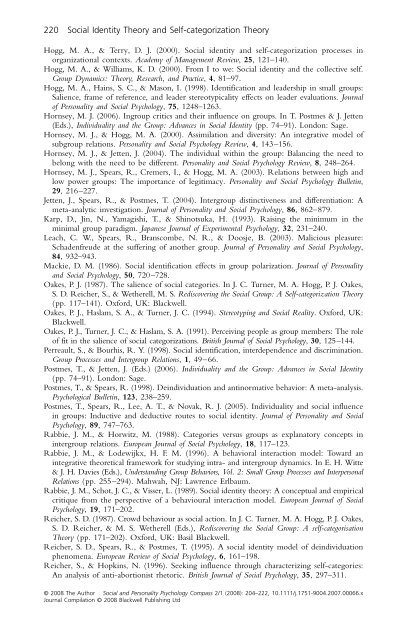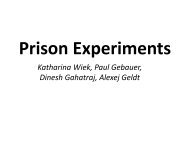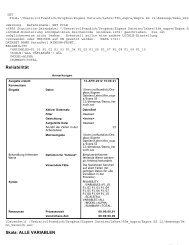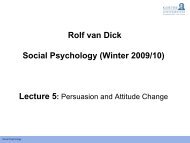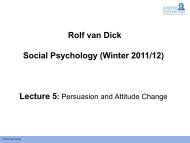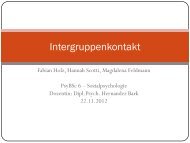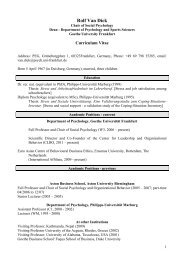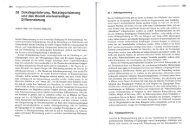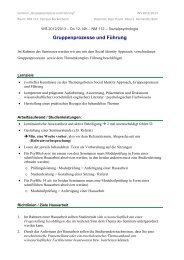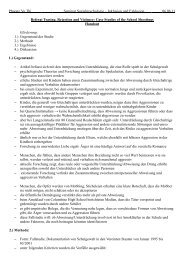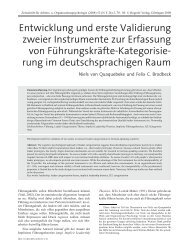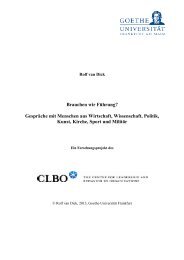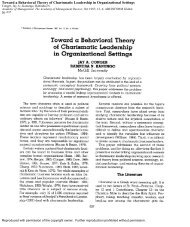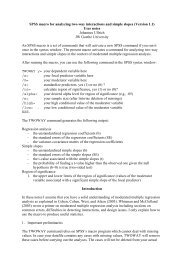Social Identity Theory and Self-categorization Theory: A Historical ...
Social Identity Theory and Self-categorization Theory: A Historical ...
Social Identity Theory and Self-categorization Theory: A Historical ...
Create successful ePaper yourself
Turn your PDF publications into a flip-book with our unique Google optimized e-Paper software.
220 <strong>Social</strong> <strong>Identity</strong> <strong>Theory</strong> <strong>and</strong> <strong>Self</strong>-<strong>categorization</strong> <strong>Theory</strong><br />
Hogg, M. A., & Terry, D. J. (2000). <strong>Social</strong> identity <strong>and</strong> self-<strong>categorization</strong> processes in<br />
organizational contexts. Academy of Management Review, 25, 121–140.<br />
Hogg, M. A., & Williams, K. D. (2000). From I to we: <strong>Social</strong> identity <strong>and</strong> the collective self.<br />
Group Dynamics: <strong>Theory</strong>, Research, <strong>and</strong> Practice, 4, 81–97.<br />
Hogg, M. A., Hains, S. C., & Mason, I. (1998). Identification <strong>and</strong> leadership in small groups:<br />
Salience, frame of reference, <strong>and</strong> leader stereotypicality effects on leader evaluations. Journal<br />
of Personality <strong>and</strong> <strong>Social</strong> Psychology, 75, 1248–1263.<br />
Hornsey, M. J. (2006). Ingroup critics <strong>and</strong> their influence on groups. In T. Postmes & J. Jetten<br />
(Eds.), Individuality <strong>and</strong> the Group: Advances in <strong>Social</strong> <strong>Identity</strong> (pp. 74–91). London: Sage.<br />
Hornsey, M. J., & Hogg, M. A. (2000). Assimilation <strong>and</strong> diversity: An integrative model of<br />
subgroup relations. Personality <strong>and</strong> <strong>Social</strong> Psychology Review, 4, 143–156.<br />
Hornsey, M. J., & Jetten, J. (2004). The individual within the group: Balancing the need to<br />
belong with the need to be different. Personality <strong>and</strong> <strong>Social</strong> Psychology Review, 8, 248–264.<br />
Hornsey, M. J., Spears, R., Cremers, I., & Hogg, M. A. (2003). Relations between high <strong>and</strong><br />
low power groups: The importance of legitimacy. Personality <strong>and</strong> <strong>Social</strong> Psychology Bulletin,<br />
29, 216–227.<br />
Jetten, J., Spears, R., & Postmes, T. (2004). Intergroup distinctiveness <strong>and</strong> differentiation: A<br />
meta-analytic investigation. Journal of Personality <strong>and</strong> <strong>Social</strong> Psychology, 86, 862–879.<br />
Karp, D., Jin, N., Yamagishi, T., & Shinotsuka, H. (1993). Raising the minimum in the<br />
minimal group paradigm. Japanese Journal of Experimental Psychology, 32, 231–240.<br />
Leach, C. W., Spears, R., Branscombe, N. R., & Doosje, B. (2003). Malicious pleasure:<br />
Schadenfreude at the suffering of another group. Journal of Personality <strong>and</strong> <strong>Social</strong> Psychology,<br />
84, 932–943.<br />
Mackie, D. M. (1986). <strong>Social</strong> identification effects in group polarization. Journal of Personality<br />
<strong>and</strong> <strong>Social</strong> Psychology, 50, 720–728.<br />
Oakes, P. J. (1987). The salience of social categories. In J. C. Turner, M. A. Hogg, P. J. Oakes,<br />
S. D. Reicher, S., & Wetherell, M. S. Rediscovering the <strong>Social</strong> Group: A <strong>Self</strong>-<strong>categorization</strong> <strong>Theory</strong><br />
(pp. 117–141). Oxford, UK: Blackwell.<br />
Oakes, P. J., Haslam, S. A., & Turner, J. C. (1994). Stereotyping <strong>and</strong> <strong>Social</strong> Reality. Oxford, UK:<br />
Blackwell.<br />
Oakes, P. J., Turner, J. C., & Haslam, S. A. (1991). Perceiving people as group members: The role<br />
of fit in the salience of social <strong>categorization</strong>s. British Journal of <strong>Social</strong> Psychology, 30, 125–144.<br />
Perreault, S., & Bourhis, R. Y. (1998). <strong>Social</strong> identification, interdependence <strong>and</strong> discrimination.<br />
Group Processes <strong>and</strong> Intergroup Relations, 1, 49–66.<br />
Postmes, T., & Jetten, J. (Eds.) (2006). Individuality <strong>and</strong> the Group: Advances in <strong>Social</strong> <strong>Identity</strong><br />
(pp. 74–91). London: Sage.<br />
Postmes, T., & Spears, R. (1998). Deindividuation <strong>and</strong> antinormative behavior: A meta-analysis.<br />
Psychological Bulletin, 123, 238–259.<br />
Postmes, T., Spears, R., Lee, A. T., & Novak, R. J. (2005). Individuality <strong>and</strong> social influence<br />
in groups: Inductive <strong>and</strong> deductive routes to social identity. Journal of Personality <strong>and</strong> <strong>Social</strong><br />
Psychology, 89, 747–763.<br />
Rabbie, J. M., & Horwitz, M. (1988). Categories versus groups as explanatory concepts in<br />
intergroup relations. European Journal of <strong>Social</strong> Psychology, 18, 117–123.<br />
Rabbie, J. M., & Lodewijkx, H. F. M. (1996). A behavioral interaction model: Toward an<br />
integrative theoretical framework for studying intra- <strong>and</strong> intergroup dynamics. In E. H. Witte<br />
& J. H. Davies (Eds.), Underst<strong>and</strong>ing Group Behaviors, Vol. 2: Small Group Processes <strong>and</strong> Interpersonal<br />
Relations (pp. 255–294). Mahwah, NJ: Lawrence Erlbaum.<br />
Rabbie, J. M., Schot, J. C., & Visser, L. (1989). <strong>Social</strong> identity theory: A conceptual <strong>and</strong> empirical<br />
critique from the perspective of a behavioural interaction model. European Journal of <strong>Social</strong><br />
Psychology, 19, 171–202.<br />
Reicher, S. D. (1987). Crowd behaviour as social action. In J. C. Turner, M. A. Hogg, P. J. Oakes,<br />
S. D. Reicher, & M. S. Wetherell (Eds.), Rediscovering the <strong>Social</strong> Group: A self-categorisation<br />
<strong>Theory</strong> (pp. 171–202). Oxford, UK: Basil Blackwell.<br />
Reicher, S. D., Spears, R., & Postmes, T. (1995). A social identity model of deindividuation<br />
phenomena. European Review of <strong>Social</strong> Psychology, 6, 161–198.<br />
Reicher, S., & Hopkins, N. (1996). Seeking influence through characterizing self-categories:<br />
An analysis of anti-abortionist rhetoric. British Journal of <strong>Social</strong> Psychology, 35, 297–311.<br />
© 2008 The Author <strong>Social</strong> <strong>and</strong> Personality Psychology Compass 2/1 (2008): 204–222, 10.1111/j.1751-9004.2007.00066.x<br />
Journal Compilation © 2008 Blackwell Publishing Ltd


